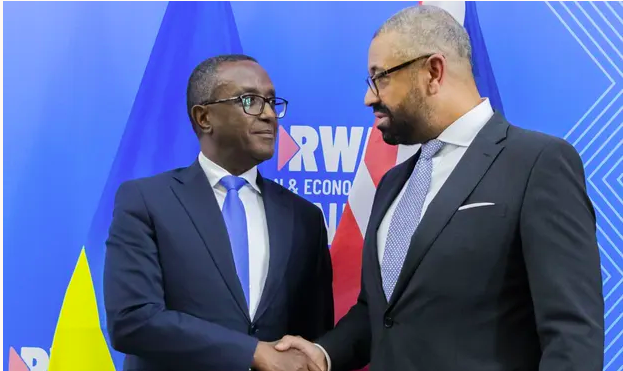
By Victoire Ingabire Umuhoza
I was sentenced to 15 years’ jail for speaking out about the government in my country. Its human rights record is appalling: Victoire Ingabire Umuhoza is Rwandan opposition leader
I came to learn about the scheme to transfer UK-based asylum seekers to Rwanda back in April 2022 when it was announced. Incredibly, the arrangement had not been discussed in public before, and even since it was signed there has been minimal debate on it.
I was among the few who publicly disapproved of the scheme, but I could only do so on social media and in foreign publications and channels, as local media would not dare give me the platform.
The policy should be opposed on the basis of the facts. Rwanda is not a free country because political rights are restricted and civil liberties are curbed. Moreover, it remains among the poorest and least developed countries in the world and the most unequal country in the east of Africa region. Anyone transferred to Rwanda will not be offered a real solution because of these constraints. In fact, because of its social and economic conditions, Rwanda also produces refugees.
How would migrants, many of whom have suffered psychological trauma, fare in such an environment and in a country that is still rebuilding itself?
Most Rwandans are indeed sensitive to the plight of those forced to leave their home countries, and would be more than willing to make them feel welcome. At the same time, they are conscious of the reality they are facing in their country. Rwandans I speak to disapprove of the deal, but wouldn’t go public about it for fear of the authorities.
I have paid and continue to pay a heavy price for expressing views that challenge the narrative of the government in Rwanda. In 2010, I returned to the country from exile in the Netherlands. I was immediately arrested after openly challenging its reconciliation policy in relation to the 1994 genocide. The then-UK parliamentary under secretary of state for Africa, Henry Bellingham, declared that I was arrested on trumped-up charges. I was sentenced to 15 years’ imprisonment by Rwanda’s supreme court.
I appealed against this decision to the African human and people’s rights court (AfHPR) and was cleared. However, the Rwandan government has refused to recognise the judgment. The African Bar Association has passed resolutions calling on the Rwandan government to obey its international obligations with reference to the AfHPR order on my case, but it has not. I served eight years in prison, including five in isolation confinement. I was finally released by presidential pardon in 2018, with conditions including a ban on leaving the country without permission. I can’t exercise my political rights, get my political party approved or meet my supporters – some of whom have been mysteriously killed or have disappeared over the past two decades.
My story and those of others who have been harassed, jailed, forced into exile or worse for challenging the government are tangible evidence of a lack of respect for human rights in Rwanda.
The UK is one of Rwanda’s most important development partners, and is clearly aware of the human rights issues here. In January 2021, UK officials raised concerns over Rwanda’s continued restrictions to civil and political rights and media freedom. Yet less than a year later the UK government chose to enter into the immigration development partnership with the country.
When the UK supreme court declared the Rwanda policy unlawful in November, it listed the human rights situation in the country among the reasons. The appeal court also stated that it was not convinced by the Home Office’s uncritical acceptance of assurances from Rwanda, or that those assurances were enough to wipe away real risks of violations while the institutions that gave rise to past violations remained in place.
After all that, it’s shocking that the UK government has opted to revive its refugee partnership with Rwanda. It has converted it into an immigration treaty and is planning to enact a bill that, if adopted by UK legislators, will confirm the country is safe. I find these approaches fruitless. In my view, the best option is for the UK to re-orient its efforts toward supporting Rwanda to improve its human rights situation.
The UK can urge the country to implement concrete actions such as the rehabilitation of politicians who were charged through politically motivated judicial processes, and the release of journalists and YouTubers imprisoned for having challenged the Rwandan government’s narrative.
Using its global influence, the UK can also mobilise the international community to endorse and facilitate dialogue between the Rwandan government and its dissenting voices, so that reforms to ensure there is political inclusion, respect for human rights and efficient rule of law are agreed on and implemented.
Through the Commonwealth Ministerial Action Group – a group that the UK and Rwanda are presently members of – the UK can advocate for solutions to improve human rights in Rwanda.
The UK already knew about the human rights situation, which has recently been flagged by its highest court. It cannot be simply solved by passing a bill that declares Rwanda a safe country, only by tackling the real issues that make it an unsafe country. Any attempts to transfer asylum seekers to Rwanda must be stopped until the UK has supported the country to improve.
Victoire Ingabire Umuhoza is Rwandan opposition leader, campaigner for governance reform in Rwanda and leader of the Dalfa Umurinzi party




























































